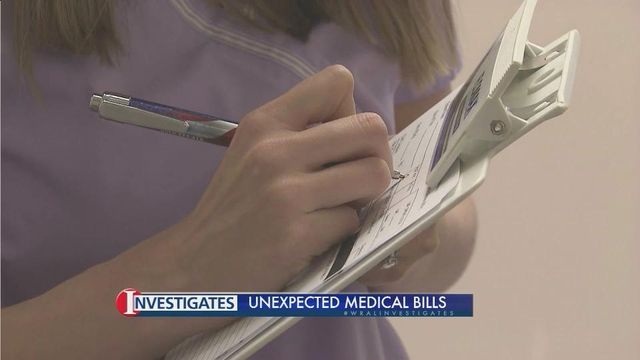Unexpected medical bills often result from insurance network confusion
When it comes to healthcare, three simple words can end up costing patients - out of network. WRAL's 5 On Your Side team has heard from more and more people who have been caught off guard by unexpected medical bills tied to network issues.
Posted — UpdatedWhen it comes to healthcare, three simple words can end up costing patients – out of network.
WRAL's 5 On Your Side team is hearing from more and more people who have been caught off guard by unexpected medical bills tied to network issues. It's happening to clients of multiple insurance companies, and it involves multiple healthcare providers and facilities.
Most people search for in-network doctors, meaning that the insurer and doctor agreed to a negotiated price for services, but unless people do research and ask questions before receiving care, they can get smacked with unexpected big bills.
Ryan Wall said a recent trip to the emergency room brought all of his concerns about healthcare costs to light.
"We expected it to be pretty brutal. I didn't expect it to be as bad as it was," Wall said.
Wall received a bill from his insurance company for about $10,500 after receiving care at WakeMed North's Emergency Room.
On the explanation of benefits from Wall's insurer, the company explained that they didn't cover any of his care to treat a problem he thought involved his appendix.
Eric Christensen had shoulder surgery earlier in the year. He went home thinking his insurance would cover the bulk of the costs.
"A couple months after the surgery, I received a bill," Christensen said, describing his $2,000 balance. He learned after-the-fact that his anesthesiologist was an out-of-network physician.
Larry Beauchamp had a similar situation. He went to the UNC Rex emergency room, which is in his network, but some of the doctors who treated him were not. He was hit with a bill totaling more than $1,000.
According to a recent Consumer Reports survey, about one third of people have received a medical bill for more than they expected to pay.
"The key to not being caught off guard is to know how much you'll pay before you go in," Consumer Reports' Doris Peter said.
When procedures are scheduled, patients should take the extra time to verify that all of the surgical team is in-network.
"If you have to go out of network, make sure you call the provider before you go to find out how much you'll have to pay, and you may be able to negotiate a better rate," Peter said.
In North Carolina, if patients go to the Emergency Room with a true medical emergency, state law says the provider must cover the patient as in-network, even if they're not.
Patients should find out which emergency rooms near them have in-network employees.
If it's tough to verify or if services still result in a big bill, patients should fight back.
That's what Christensen did. About a month after receiving his bill he got a follow-up statement that his insurer had paid the balance.
Larry Beauchamp battled his bill for months. After 5 On Your Side contacted his insurance company, he got a call saying the bills should have been paid, and will be.
Wall received the same treatment. His insurance company now says his claim was "processed incorrectly," then paid the entire $10,500 bill.
"This has been a yo-yo experience," Wall said. "One minute it's really down and we're responsible for so much, and then the other minute, well, maybe not so much. No other industry gets way with this kind of jerking around."
There is a push to make insurance bills more transparent. {{a href= "external_link-15134208"}} A bill introduced in October in the U.S. House {{/a}} aims to end surprise billing.
Remember the following things before and after trips to the hospital:
- Make sure your hospital is in network before you need it
- Choose the best insurance plan you can afford
- If you're not sure about a bill, question it
• Credits
Copyright 2024 by Capitol Broadcasting Company. All rights reserved. This material may not be published, broadcast, rewritten or redistributed.





